Yoga for menopause: benefits, tips, and poses to try
Trying yoga for menopause can help ease symptoms, here’s how

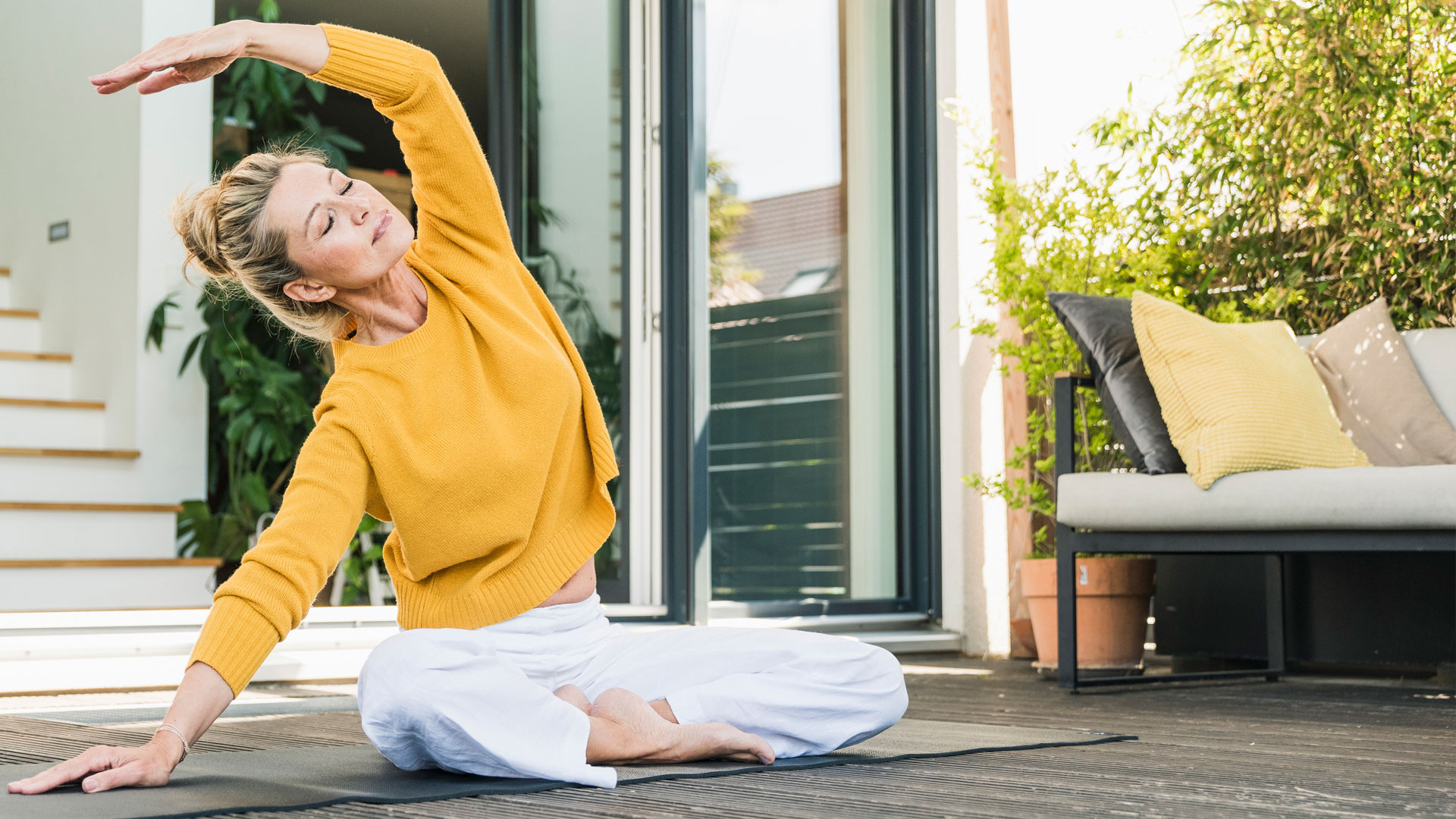
Considering yoga for menopause? Focusing on moving your body through a series of poses and breathwork exercises are ideal for helping to ease uncomfortable symptoms and side effects of menopause. Common symptoms include, but are not limited to, fatigue, poor concentration, disturbed sleep, muscle aches, night sweats, and hot flushes.
Yoga is proven to be an effective remedy to help reduce both physical discomfort and improve mental wellbeing during menopause according to a study cited in the Menopause International Journal.
Importantly, as a natural part of aging, menopause is no longer a topic that can only be discussed behind closed doors. It’s a subject that we should all be talking about more openly so we can understand how it affects each individual and share ways to help improve the experience for everyone.
Whether you’re already taking the best menopause supplements and want to try out other ways to manage your symptoms, we asked expert yoga instructor, Sarah Highfield to share her top tips for practicing yoga when going through menopause. So, grab one of the best yoga mats and just keep reading.
Yoga for menopause: what are the benefits?
Yoga and breathwork offers a multitude of benefits towards helping to ease both physical and menopausal symptoms. While menopause can turn your daily routine upside down, here are some tried and tested tips to help restore some balance and a more stable routine back into your life.
Helps improve poor concentration
Yoga helps to improve poor concentration brought on by menopause by offering a moment in the day when you can put distractions to one side and focus purely on yourself. Modern life means we are often caught up with work, or distracted by news, social media, television, or other digital media. Through practicing yoga, you are encouraged to ignore your distractions and focus on slow physical movements along with controlled breathing.
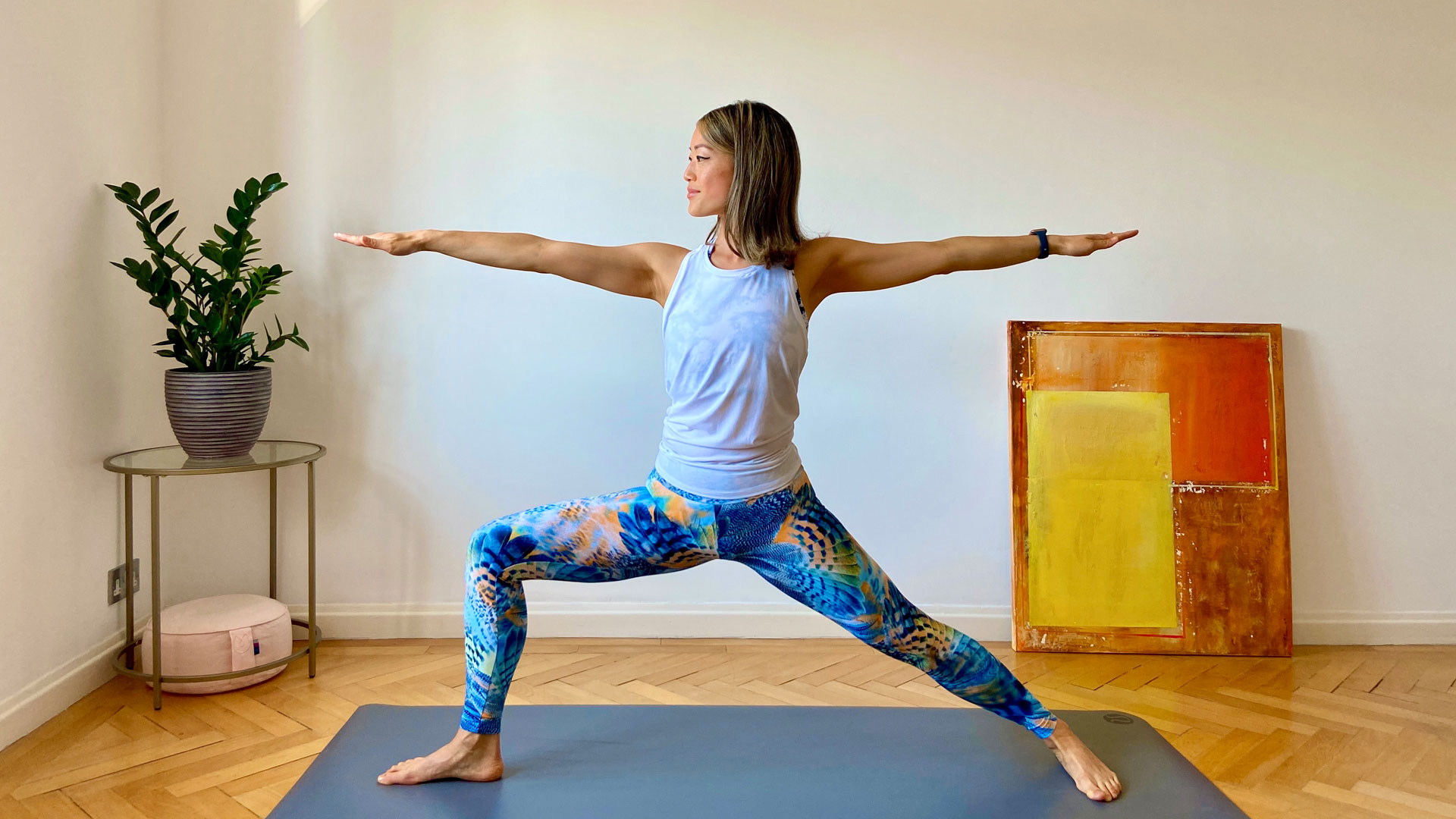
Helps to increase energy levels
Yoga can help to reduce fatigue and increase energy levels by stimulating your mind and decreasing cortisol levels - the stress hormone. In research cited in the journal of Oxidative Medicine and Cellular Longevity, yoga was proven to slow cellular aging and decrease levels of cortisol. The research identified a strong correlation between our energy levels, health, and the rate at which we age with our lifestyle choices.
Helps to manage hot flushes
Sitali pranayama is a yoga breathwork exercise that helps to cool the body down and calm the nervous system which can be applied when you’re experiencing hot flushes. It is commonly known as the ‘cooling breath’ and works by adding moisture to the body and regulating body temperature. The exercise is done by rolling the tongue into a circular shape and breathing through it like a straw.
Soothes muscle aches
Menopausal muscle and joint pain, commonly known as menopausal arthralgia, can be managed with the help of gentle yoga stretches, which keep the muscles flexible, and joints active and mobile. A study in the Biomedicine & Pharmacotherapy journal stated that practicing yoga regularly not only aids general mobility, but is gentle and low-impact, and also helps to push synovial fluid around the joints and strengthen the muscles which support the joints.
Promotes an overall sense of wellbeing
A study carried out in the journal Maturitas supported the effectiveness of yoga for safely reducing menopausal symptoms. Practicing yoga regularly promotes an overall sense of well being by reducing blood pressure, increasing serotonin levels, encouraging a sense of serenity, easing anxiety, and stretching out the whole body.
Which type of yoga is best for menopause?
The best style of yoga to practice for alleviating menopause symptoms is a mix of gentle vinyasa flow, with hatha and restorative, along with breathing exercises and meditation. If a gentle vinyasa flow is too dynamic, then it’s better to focus on hatha and restorative yoga.
10-minute yoga for menopause sequence
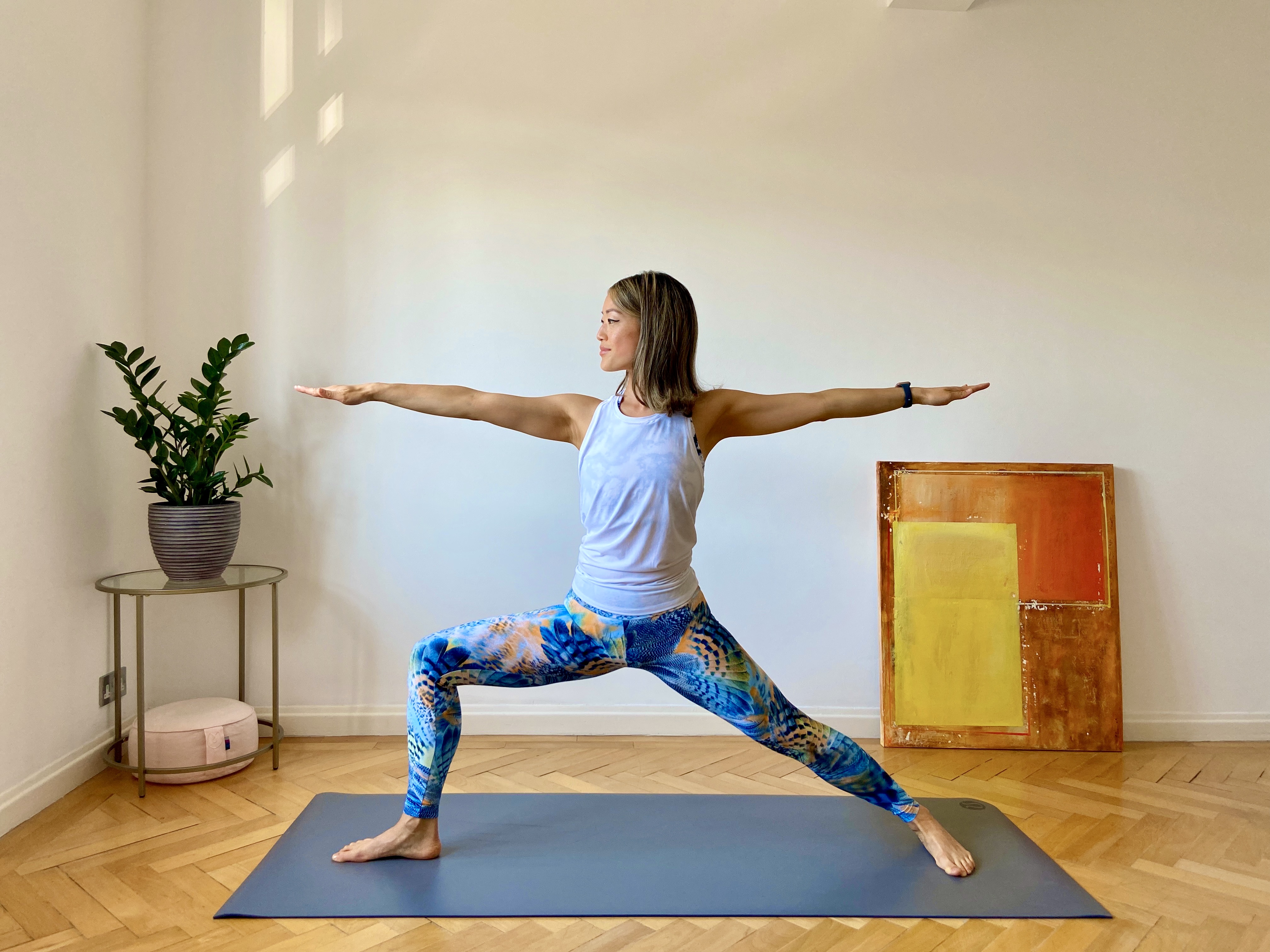
Follow this simple 10-minute yoga sequence to soothe your body during menopause. You have an option to do a vinyasa between each pose so that you can enjoy a yoga flow, or you can do the poses alone and make it a hatha style practice.
Yoga Pose One: Warrior Two
How to: Start with your right foot forward and your left foot behind, look down at your feet to check that your heels are roughly in line. With an inhalation, lift your arms up so they are parallel to the floor and with an exhalation, bend your right knee so that it is above your right heel. Keep your core lightly engaged, extend out through your fingertips and soften your shoulders away from your ears. Hold the pose for six-eight deep breaths in and out of your nose and then repeat on the second side.
Benefits: This empowering pose strengthens the legs, and stretches the hips & chest, along with soothing tight muscles. It also improves balance, circulation, strengthens the joints and energizes the entire body.
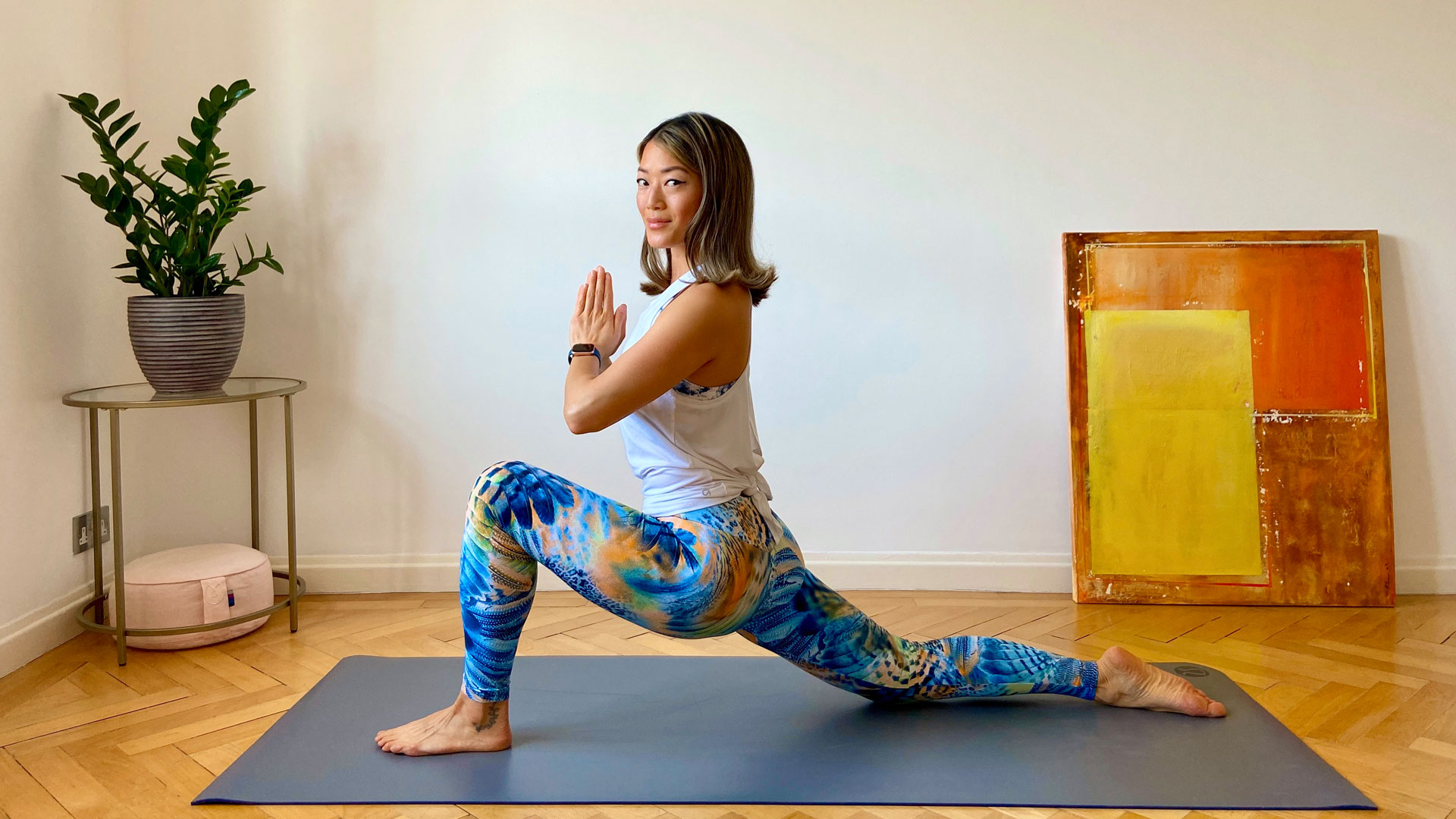
Yoga Pose Two: Low Lunge
How to: Place your left foot forward and your right knee down on the floor (use a soft cushion under your back knee if needed). On an inhalation, bring your hands into prayer position at your heart center, and on exhalation, sink your hips down and forward. Keep your core lightly engaged and spine long. Hold the pose for six-eight deep breaths in and out of your nose and then repeat on the second side.
Benefits: Backbends are proven to stimulate the nervous system and release endorphins. The deep opening through the front of the body helps to relieve stress and boost energy. Many people find that stretching the front of the body also helps to free up the emotions and release tension.
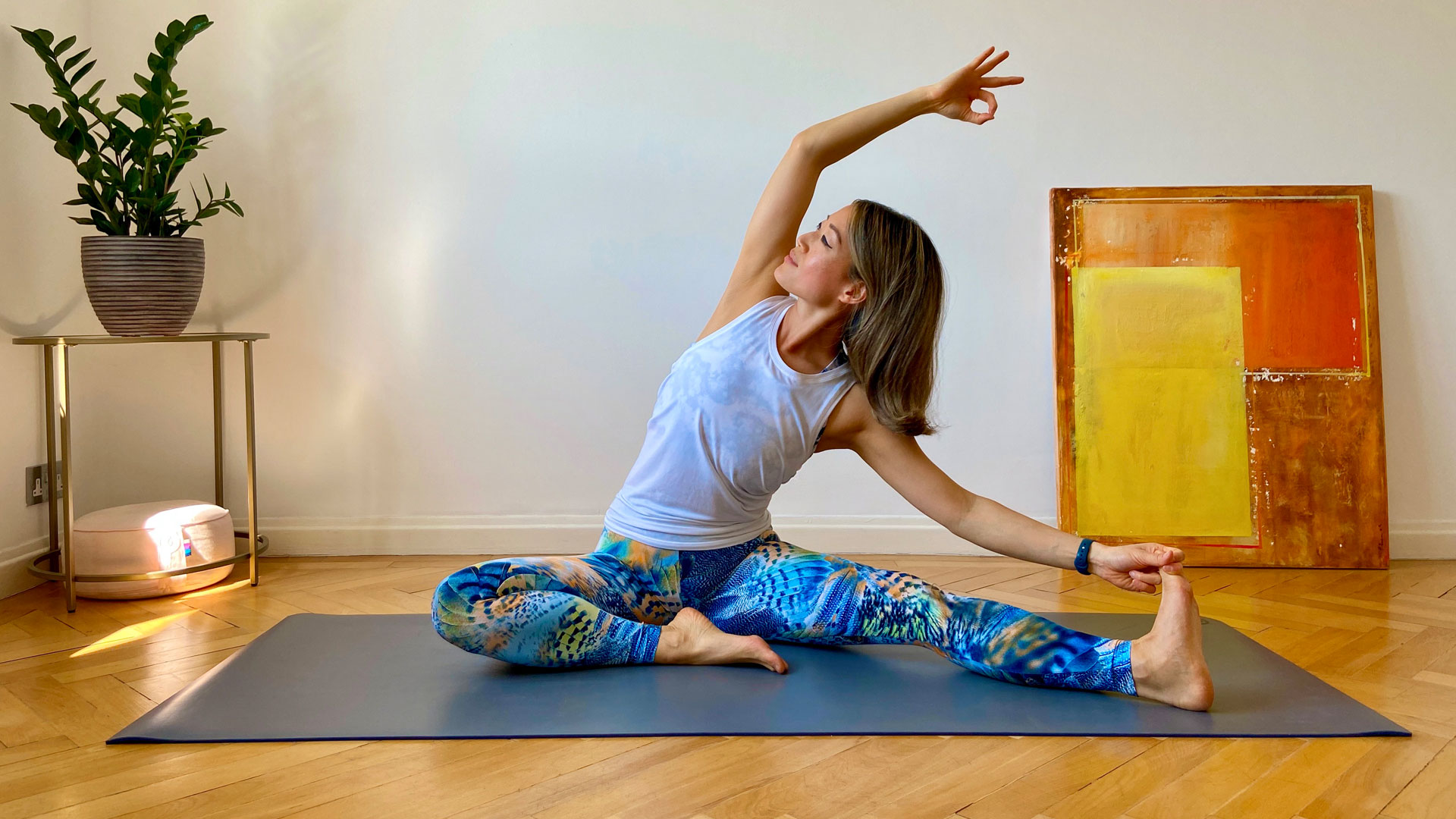
Yoga Pose Three: Revolved Head-to-knee
How to: Sitting on the floor, fold your left leg in and extend your right leg out to the side. Reach out to hold onto your right big toe with your right hand, then stretch your left arm up and over, while gently rotating your torso up. Hold the pose for six-eight deep breaths in and out of your nose and then repeat on the second side.
Benefits: This pose has the calming benefits of a twist, as well as the mood-boosting advantages of a chest and shoulder opener. The stretch in the hamstring delivers a good release and provides the foundation for many other yoga poses. The pose can also help to soothe anxiety, depression, and fatigue.
Breath Meditation
Research cited in the Journal of Clinical Interventions in Aging backs evidence that quality of life for menopausal women is greatly improved through yoga, pranayama (yogic breathing exercises), and meditation. One widely practiced pranayama and meditation hybrid is a breath meditation, which helps to bring your awareness into the present moment, breathe consciously and find your inner stillness.
How to: Sitting comfortably or lying down, close your eyes and begin by focusing your breath. Try not to control your breath, but allow it to flow in and out as naturally as possible. Begin by noticing how it feels to breathe and observe where you feel the breathing taking place in your body. Next, listen to any faint sounds you make as you breathe and feel the subtle movements of your chest and abdomen. Think of the breath as cleansing, so you are breathing in fresh, clean air, and exhaling out stale, old air. Try to stay in your breath meditation for a few minutes to start with, then over time, you may wish to increase the length of the practice.
Benefits: By closing your eyes, you can direct your attention inward and become fully present in the moment. This simple meditation delivers an overall sense of focus and calm, which in turn helps to lower stress levels, reduce heart rate, reduce depression and manage pain.
Start your week with achievable workout ideas, health tips and wellbeing advice in your inbox.
Born in Hong Kong and based in London, Sarah Highfield is a leading yoga teacher and writer, as well as the founder of Yogagise Yoga. Sarah has been practising yoga since 2003 and teaching yoga since 2015. She has taught at prominent studios including Bodyism & Yogabambam Hong Kong. She also leads yoga teacher trainings, as well as at high profile events including Om Yoga Show London and World Yoga Festival. Additionally, Sarah runs her own yoga retreats, alongside collaborations with Helios Retreats, Lululemon, London Fashion Week, Mortimer House & Catherine’s in Antigua. She has also featured broadly across high profile print and online media. Sarah believes there is a style of yoga for everyone and encourages students to discover what works for them. In her free time, she is a big foodie, loves to travel and spends as much time as possible with family and friends.
